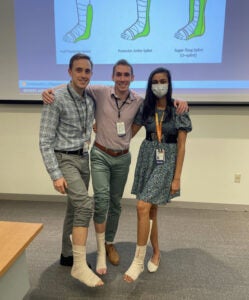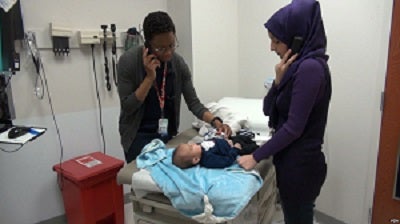Curriculum Highlights
Our program provides our residents an outstanding, well-rounded training experience. Our unique strengths and curricular offerings enhance our resident’s training.
Another element that is unique to our program is the “hybrid nature” of the curriculum. While many rotations take place at the University of Virginia Hospital, we also have a strong emphasis on, and have required curricular elements in, rural medicine. You will find that many of our resident rotations take place in the offices of physicians in the community rather than at the University of Virginia Hospital. This allows our residents to experience the “real world feel” that is prevalent in many community programs. We are proud that 20% of our graduates practice in rural communities.
Our primary teaching practice offers residents a diverse range of patients. We provide care to University faculty and staff, residents of surrounding rural counties, and Charlottesville’s public housing communities. We also care for a large number of refugee and immigrant patients in our International Family Medicine Clinic.
A major focus of the department involves the practice and teaching of Information Mastery, a physician-friendly method of applying evidence-based medicine in every day practice. Kate DeGeorge, one of our faculty and an editor for Dynamed ® has built on the work of alumnus and former faculty member Dr. David Slawson, to develop a dynamic and engaging curriculum to give our graduates the skill to manage and use information to provide the best care possible to their patients throughout their career. Our faculty are well-versed in the principles of EIDM and integrate it into classroom and clinical teaching – it is a part of our department’s “DNA.
The goal for our longitudinal health equity curriculum is for graduates of UVA Family Medicine Residency Program to be advocates for their patients at the clinic, health system, community, state, national, and international level. Over the course of their training, residents learn about social determinants of health, health disparities, the social structures that create and perpetuate health disparities, and the actions they can take to affect change for the promotion of health equity. The curriculum has a particular focus on the historical and present-day impact of racism on health disparities.
Goals: Through the completion of the curriculum, learners will:
- Recognize the structural root causes of health disparities
- Critically evaluate the ways in which racism, culture, and power perpetuate the status quo by shaping knowledge production
- Use critical reflection to shape their own work and advocate for institutional change
Anti-Racism Conference Series: Composed of a mix of lectures, readings, videos, and conversation, the Anti-Racism Conference Series complements the health equity curriculum by dedicating time for discussion and reflection on the effects of racism in healthcare. Additionally, the reserved time is used flexibly in the event that a pivotal event occurs which warrants timely debrief. The aim of this aspect of the curriculum is to provide attendees with first-hand accounts of lived experiences and perspectives of racism in medicine in an effort to develop into antiracist healthcare providers.
Another focus of the program is on behavioral medicine teaching. Our behavioral medicine educators, as well as our physician faculty, help residents learn to better care for themselves, motivate patients to change behavior and learn therapy skills relevant to Family Medicine, through didactics and a rotation in the Family Stress Clinic. We also practice an integrated model of primary care and mental health care that we call Collaborative Care: Our staff therapists and psychologists will come see your patient who needs additional help – whether that is to support the patient in a life crisis or to address a particularly challenging health behavior.
Click here to view a brochure with more details regarding our behavioral medicine teaching.
The International Family Medicine Clinic (IFMC) continues to grow. Since its inception in October 2002, we have seen over 4,200 who originate from many countries, including Afghanistan, Burma, Bhutan, Democratic Republic of the Congo, Somalia, Sudan, Togo, Liberia, Russia (Meshketian Turks), Iraq, Syria. From Burma (Myanmar), we have several ethnic groups (Burmese, Kachin, Chin, Karen and Karenni). The average age of our
patients is 26.1 years.
The IFMC is a unique model of care, in close partnership with the International Rescue Committee (IRC) and Blue Ridge Health District (BRHD). We see the majority of refugees who come to Charlottesville. Most stay with us, but some may choose to leave for other practices/doctors in Charlottesville, or out-migrate to another part of the United States.
 One of the highlights of each resident’s year is our Essentials of Family Medicine (EFM) rotations. In each year of residency we “pull residents off the wards” and put them together in the classroom for didactics, workshops, group projects, team-building time and outpatient clinic. We tailor each of these blocks to the educational needs of the residents. For example, we deliver much of our Practice Management curriculum in the third-year, during EFM III. These blocks of dedicated didactic time allow us to ensure that each resident, in each year, will engage in learning that we believe is essential to the practice of Family Medicine, and are a great complement to our weekly conferences.
One of the highlights of each resident’s year is our Essentials of Family Medicine (EFM) rotations. In each year of residency we “pull residents off the wards” and put them together in the classroom for didactics, workshops, group projects, team-building time and outpatient clinic. We tailor each of these blocks to the educational needs of the residents. For example, we deliver much of our Practice Management curriculum in the third-year, during EFM III. These blocks of dedicated didactic time allow us to ensure that each resident, in each year, will engage in learning that we believe is essential to the practice of Family Medicine, and are a great complement to our weekly conferences.

